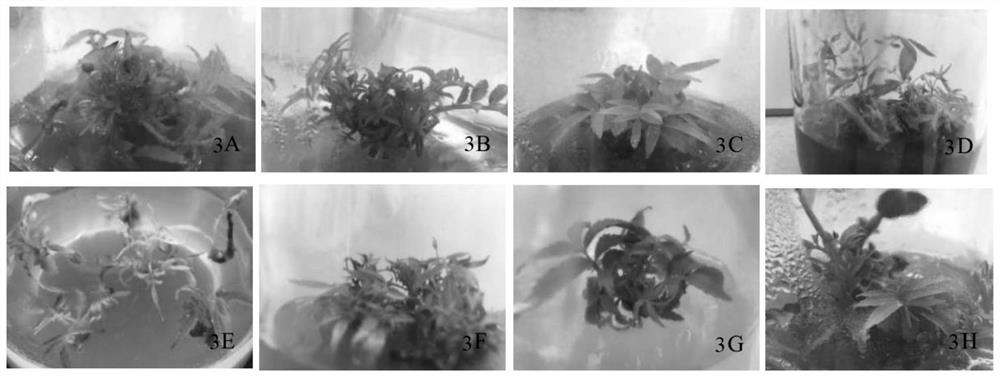A kind of adventitious bud induction and sub-proliferation culture method of A. chinensis
A technology of subculture propagation and culture method, which is applied in the field of adventitious bud induction and subculture propagation of Cyclocarya paliurus, can solve the problems of poor repeatability, poor callus growth state, and low differentiation rate of callus adventitious buds. Strong growth, reduced pollution rate and death rate, and increased induction rate
- Summary
- Abstract
- Description
- Claims
- Application Information
AI Technical Summary
Problems solved by technology
Method used
Image
Examples
Embodiment 1
[0032] Alcohol and sodium hypochlorite were selected to study the disinfection treatment of Cyclocarya paliurus, and the disinfection time of 75% alcohol: 25s, 30s. 10% sodium hypochlorite treatment time: 3min, 3.5min, 4min. The experimental design is detailed in Table 1. After trimming and rinsing, the stem segments are placed on an ultra-clean workbench, further disinfected with ethanol and sodium hypochlorite, and rinsed 4-5 times with sterile water after the disinfection is completed. Cut off the sterilized stem section with buds on the sterilized filter paper and cut off the part oxidized by the disinfectant and place it flat in the culture medium. After 10 days, observe the pollution of the stem section after inoculation, and observe the pollution characteristics of the explants to further judge Causes of pollution, and statistical pollution rate and death rate, the results are shown in Table 2.
[0033] It can be seen from Table 2 that for the pollution and death of e...
Embodiment 2
[0040] In order to study the effect of basic medium on the induction and proliferation of adventitious buds of Cyclocarya paliurus, five kinds of basic medium were set up in this experiment: MS, WPM, B5, DKW, 1 / 2MS (excluding macroelements and CaCl 2 1 / 2 of the full amount, and the rest are the full amount). The experiment was carried out by a single-factor randomized block experiment. The sterilized stems of Cyclocarya paliurus were placed on sterilized filter paper (11×11cm) to blot the water, and the oxidized parts at both ends of the stems were removed with sterilized scissors. and some petioles at the leaf axils, the pruned stems were inoculated in the culture medium, and the same hormone combination was added to the basic medium respectively. Part; the incision is inclined to increase the contact area between the cut surface and the medium; when the trimmed stem section is inserted into the high-temperature sterilized medium vertically, the insertion depth of the stem se...
Embodiment 3
[0047] In order to induce the first generation of adventitious buds from the stem segment of Cyclocarya paliurus, this experiment added auxomodulin 6-BA to the WPM basic medium, and mainly studied the effect of 6-BA concentration on the induction of adventitious buds in Cyclocarya paliurus. Table 4 below. The explants are selected from the sterilized, sterilized, and pruned stem segments in the previous stage, and are vertically inserted into the adventitious bud induction medium. The insertion depth accounts for about 1 / 4 of the length of the stem segment, and one stem segment is inserted into each bottle of medium , 20 bottles were inoculated at a time, and repeated 3 times. During this process, the environmental conditions in the cultivation room were controlled, and the contaminated materials and culture medium were cleaned up in time. After 20-25 days of cultivation, the induction of adventitious buds was counted, and the induction rate of clustered buds, the number of ne...
PUM
 Login to View More
Login to View More Abstract
Description
Claims
Application Information
 Login to View More
Login to View More - R&D
- Intellectual Property
- Life Sciences
- Materials
- Tech Scout
- Unparalleled Data Quality
- Higher Quality Content
- 60% Fewer Hallucinations
Browse by: Latest US Patents, China's latest patents, Technical Efficacy Thesaurus, Application Domain, Technology Topic, Popular Technical Reports.
© 2025 PatSnap. All rights reserved.Legal|Privacy policy|Modern Slavery Act Transparency Statement|Sitemap|About US| Contact US: help@patsnap.com



